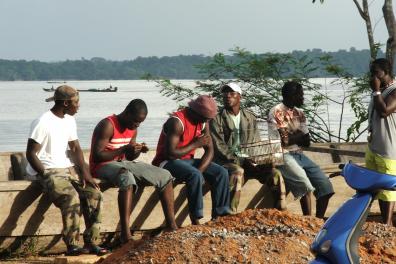Language practices - fields, methods, theories

The aim of this seminar is to support M2 and PhD students interested in the use of language practices in contexts such as the family, school, work, health or justice, traversed by issues of power and inequality. A strong emphasis is placed on relevant methodological approaches and theoretical frameworks (interactional sociolinguistics, critical sociolinguistics, sociology of language, discourse analysis, linguistic anthropology, political anthropology, etc.), and on the circulation of knowledge from a variety of geographical areas and academic traditions, in order to link the study of language practices with contemporary socio-anthropological and political issues. In 2024-2025, the seminar will focus on issues of discrimination.
Seminar dates in 2024-2025: 07/02, 07/03, 04/04.
Location: room LO.01 at Inalco's Maison de la Recherche (2, rue de Lille - 75007 Paris)
(except 07/02 exceptionally at PLC 65 rue des Grands Moulins, Amphi 8).
The lectures are also broadcast via Zoom.
Session on February 7, 2025
Location: PLC (65, rue des Grands Moulins - 75013 Paris - Amphi 8) - exceptionally
Times: 2-5pm
- Birgül Yılmaz (University of Exeter): Linguistic precarity and (im)mobility in Greece
Based on an 18 month long ethnographic fieldwork in Athens, where I observed English language classes organised in a radical cafe, where I met a group of refugees who lived in a squat, in this presentation, I focus on how (im)mobility shapes refugees' linguistic needs. I investigate how waiting as a bordering technology and language learning practices of refugees intersects whilst they plan their journeys to northern Europe via human smugglers. The notion of linguistic precarity refers to uncertainties, anxieties, vulnerabilities, insecurities experienced by individuals who make temporary investments in their language learning choices. I discuss how my participants mobilise vulnerability, lack of language(s), through self-organised teaching and learning, to reduce their condition of precarity.
Session on Friday 7 March 2025
Location: Maison de la Recherche de l'Inalco, 2 rue de Lille (Paris 7e), room L0.01. The seminar will also be accessible via zoom (https://zoom.us/j/97206470067).
Time: 2pm-5pm
- Ian Cushing (Manchester Metropolitan University) :Designing futures of linguistic justice: teachers dismantling deficit thinking in schools
Deficit thinking is a person-centred, victim-blaming ideology which deflects attention away from structural injustices and frames marginalised communities as deficient and requiring remediation - especially about language, and especially in schools. Whilst such ideologies are long-standing and pervasive, recent work has exposed a resurgence of deficit thinking about language in England's education policy architecture. This talk examines efforts by teachers to dismantle deficit thinking in the pursuit of linguistic justice. It draws on data from a longitudinal project where I collaborated closely with a group of teachers in coordinated attempts to dismantle deficit thinking at individual, departmental, and institutional levels. As part of this collaboration, we designed a flexible, proactive framework for anti-deficit struggles about language. This included rejecting dominant language ideologies; teachers as activists; cross movement solidarity and collective struggles; institutional support; building on historical efforts, and abolitionist visions for transformative change. I talk through aspects of this framework and its potential in contributing to linguistic justice efforts.
Session on Friday, April 4, 2025
Location: Maison de la Recherche de l'Inalco, 2 rue de Lille (Paris 7e), salle L0.01. The seminar will also be accessible via zoom (https://zoom.us/j/97206470067).
Time: 2pm-5pm
- Philipp Angermeyer (York University): Discriminatory translation and paths towards linguistic justice
In multilingual institutional settings, the use of interpreters or translators is generally treated as a remedy to linguistic inequality, that is, as a benevolent activity conducted for the benefit of speakers of non-official languages. However, institutional choices of what is translated and how can effectively lead to discrimination against these speakers, for example by systematically restricting their participation in institutional interaction, or by perpetuating discriminatory stereotypes about them, a phenomenon for which I have proposed the term punitive multilingualism.
Drawing on examples from my research on court interpreting (Angermeyer 2015) and linguistic landscape (Angermeyer 2017, 2023), I examine how institutional practices of translation often benefit primarily the institution, and also how they index ideologies about languages and their speakers. To pursue paths towards greater linguistic justice in multilingual context, I argue for a need to examine translation practices within a wider context of ideologies about language contact, language variation, raciolinguistics and linguistic diversity.